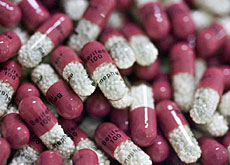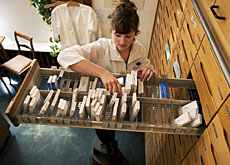Generic drugs market soars

The Swiss generics market showed strong growth in 2006, jumping by almost 50 per cent, according to an industry study.
But the report, published on Monday by Interpharma, highlighted slower overall growth across the pharmaceutical industry, and falling medicine prices.
In 2006 the Swiss pharmaceutical industry generated SFr4.2 billion ($3.36 billion) in revenue. This represents a 1.9 per cent rise on the previous year, compared with 3.8 per cent in 2005.
Meanwhile, the average price of prescription drugs manufactured in Switzerland fell by 3.8 per cent between 2005 and 2006, from SFr40.39 to SFr38.92.
“Industry growth is at an all-time low,” said Thomas Binder of market research firm IMS Health.
The reason for the lower growth against a backdrop of rising sales is down to the increased use of generic medicines, he added.
Generic competition
In three years the Swiss generics market has more than doubled turnover to around SFr381.2 million.
In 2006 it once again showed stronger-than-average growth, with a 46.4 per cent hike, compared with 41 per cent in 2005. Generic drugs now make up around 12 per cent of the Swiss medicine market.
At the same time revenues from original brand-name drugs whose patents have run out fell by 47.8 per cent as a result of much lower prices.
Two leading Swiss generic manufacturers, Mepha and Sandoz, have benefited from this development and now share almost 75 per cent of the generic cake, said Interpharma. Mepha’s market share rose by 38.2 per cent, while Sandoz’s increased by 74.6 per cent.
The association adds that the arrival of new actors is likely to further stimulate competition and drive prices downwards.
Effective measures
According to the pharmaceutical association Interpharma, this trend confirms the long-term impact of economic measures taken in recent years, such as price monitoring and the promotion of generics.
From January 1, 2006, patients with prescriptions for brand drugs rather than generics have had to pay 20 per cent of the drug’s cost – unless there is a valid medical reason.
Previously the patient’s contribution for a brand drug was ten per cent. The patient’s contribution for a generic drug has remained at ten per cent.
“Our objective of SFr250 million in cost-savings will be easily exceeded,” claimed Walter Hölzle, director of the association for importers of pharmaceutical specialties.
For 2007 the industry expects overall growth to remain slow.
“It’s difficult to make predictions in such an up-and-down period,” said Binder.
But he still expects three to four per cent growth for the Swiss medicine market, compared with five to six per cent worldwide.
Interpharma said the full effects of competition and lower prices introduced in 2006 will be felt next year, despite the marketing of innovative treatments against serious illnesses such as cancer.
swissinfo with agencies

More
Health insurance
Health costs in Switzerland have been spiralling upwards in recent years. In 2003 they represented 11.5% of gross domestic product, compared with 9.7% in 1995 and 8% in 1985.
Health spending amounted to SFr6,736 per inhabitant in 2003, representing a total cost of almost SFr50 billion.
As a result, health insurance premiums have been rising every year and have become unaffordable for many people.
In November 2005 Interior Minister Pascal Couchepin introduced measures encouraging people to choose generic drugs over brand products. Those wanting the original drug would have to dig deeper into their pockets.
Historically the Swiss generics market has been relatively low compared with other European markets including Britain, Germany, the Netherlands and Denmark.
Strong brand loyalty and the reputation of the major pharmaceutical companies meant that Swiss doctors, who weren’t really pressured to use low-price alternatives, gave preference to brand drugs if they had a choice.
Over the past couple of years the generics market in Switzerland has almost exploded because of a strong push from the government and from health insurance companies to exploit the generic potential much stronger than previously. Also, several major patented medicines came off patent.
Generic drugs represent an estimated 12 per cent of the Swiss medicine market.

In compliance with the JTI standards
More: SWI swissinfo.ch certified by the Journalism Trust Initiative











You can find an overview of ongoing debates with our journalists here . Please join us!
If you want to start a conversation about a topic raised in this article or want to report factual errors, email us at english@swissinfo.ch.